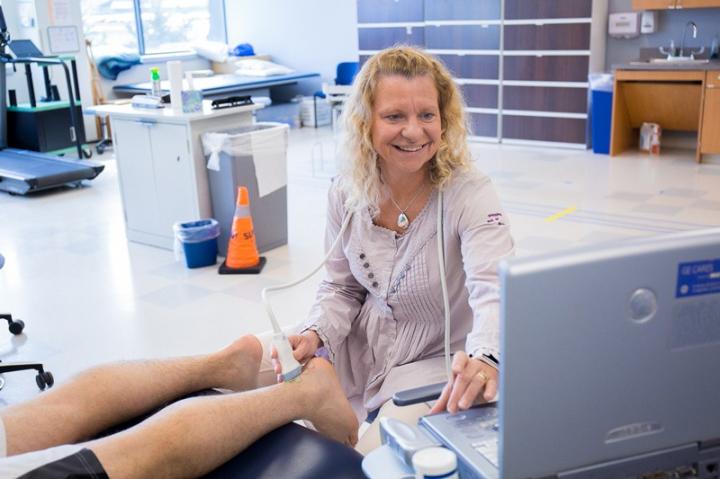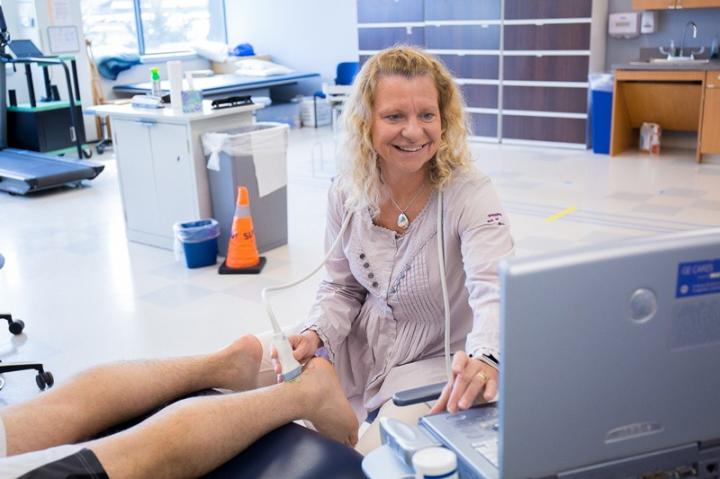
Credit: University of Delaware/ Aaron Davis
University of Delaware assistant professor Karin Gravare Silbernagel (Physical Therapy) received a five-year, $2.3 million Research Project Grant (R01) from the National Institute of Arthritis and Musculoskeletal and Skin Diseases to study Achilles tendinopathy.
This overuse injury is most prevalent in active individuals between the ages of 35 and 55, but occurs in people of all ages and activity levels.
Silbernagel's relentless research focus is to find more efficient, individualized treatment for tendon injuries. This R01 study will be the first-ever to evaluate possible recovery differences between males and females with Achilles tendinopathy — focusing on tendon structure and mechanical properties, along with symptomatic and functional recovery.
In many cases, a patient decides to self-address the injury by not exercising for long periods for time — a practice shown to be ineffective. Full recovery is achievable, but more evidence is needed to understand how to best individualize the treatment.
"We know that exercise works well, but there are discussions [amongst physical therapy researchers] that it's not as efficient for some patients. Certain people take a really long time to recover while others recover much quicker," said Silbernagel, who has performed tendon research for more than a decade. "That means we have lots of variabilities that we don't fully understand. To give individualized advice to each patient, we need to better grasp these variabilities."
While the public is more familiar with Achilles tendon ruptures (in athletes like Ryan Howard and Kobe Bryant), Achilles tendinopathy is understudied in research circles.
"The injury starts with morning stiffness. It gets to a point where activity is tough," Silbernagel said. "Recovery takes a long time, so people stop being physically active, which we know is bad. Resting for long periods of time doesn't help."
Symptoms
Tendinopathy is characterized by localized or diffuse increase in thickness, loss of normal collagen architecture, increased amount of proteoglycans and a general breakdown of tissue organization. Historically, health professionals assumed Achilles tendinopathy was purely an athletic injury. Recent reports indicate that 65 percent of those diagnosed in general practice were not sports related. The primary symptom is pain during daily activities such as walking, running or other exercise. Aside from the pain, Achilles tendinopathy can significantly decrease physical activity level, resulting in further negative effects on overall health and wellbeing. On-again, off-again symptoms over the course of many years are common; reoccurring pain is often related to resuming physical activity. The treatment for Achilles tendinopathy (with the most evidence) is therapeutic exercise, providing mechanical loading of the muscle-tendon unit.
Study aims
Silbernagel's first aim is to evaluate if there are differences in change over time in symptoms, muscle-tendon function, tendon structure and mechanical properties between males and females receiving exercise treatment. Her second aim is to investigate whether the presence and magnitude of tendon structural abnormality will affect the ability and time of recovery. And a final aim is to explore if patients who continue to have symptoms at the 16-week evaluation further improve, specifically muscle-tendon function, tendon structure and mechanical properties; researcher will evaluate participants over the course of one year.
###
Media Contact
Peter Bothum
[email protected]
302-831-1418
@UDResearch
http://www.udel.edu





